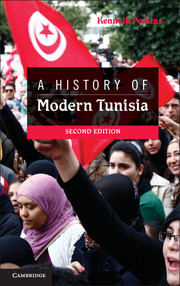Book contents
- Frontmatter
- Contents
- List of Maps
- List of Illustrations
- Acknowledgments
- A Political Who’s Who of Modern Tunisia
- Map of Tunisia
- Introduction to the Second Edition
- Introduction to the First Edition
- Chapter 1 The March to the Bardo, 1835–1881
- Chapter 2 Whose Tunisia? 1881–1912
- Chapter 3 Squaring Off, 1912–1940
- Chapter 4 Redefining the Relationship, 1940–1956
- Chapter 5 The Independent State Sets Its Course, 1956–1969
- Chapter 6 Regime Entrenchment and the Intensification of Opposition, 1969–1987
- Chapter 7 Constancy and Innovation in the “New” Tunisia, 1987–2003
- Chapter 8 A Revolution for Dignity, Freedom, and Justice
- Notes
- Suggestions for Further Reading
- Index
Chapter 3 - Squaring Off, 1912–1940
Published online by Cambridge University Press: 05 June 2014
- Frontmatter
- Contents
- List of Maps
- List of Illustrations
- Acknowledgments
- A Political Who’s Who of Modern Tunisia
- Map of Tunisia
- Introduction to the Second Edition
- Introduction to the First Edition
- Chapter 1 The March to the Bardo, 1835–1881
- Chapter 2 Whose Tunisia? 1881–1912
- Chapter 3 Squaring Off, 1912–1940
- Chapter 4 Redefining the Relationship, 1940–1956
- Chapter 5 The Independent State Sets Its Course, 1956–1969
- Chapter 6 Regime Entrenchment and the Intensification of Opposition, 1969–1987
- Chapter 7 Constancy and Innovation in the “New” Tunisia, 1987–2003
- Chapter 8 A Revolution for Dignity, Freedom, and Justice
- Notes
- Suggestions for Further Reading
- Index
Summary
World War I
Their pan-Islamic sentiments and affinity with the Young Turks made Istanbul a logical place of refuge for many Young Tunisian exiles, but they regarded the Ottoman capital as merely a temporary haven. They were anxious to return to Tunisia at the earliest opportunity in order to continue their drive to reform the protectorate. Those who still resided in Istanbul at the outbreak of World War I contributed to the Ottoman and German war effort, often by writing anti-French propaganda. They hoped that the victory of the Central Powers would strip France of its North African holdings, enabling Tunisia to reclaim its earlier political identity as an autonomous region of the Ottoman Empire. Another group of Tunisians, led by Muhammad Bash Hamba, ʿAli’s brother, spent the war in Switzerland, where they published the political journal La Revue du Maghreb from 1916 to 1918. Bash Hamba warned that by crushing the Young Tunisian movement in 1912, France had destroyed any prospect of a fruitful association between Muslims and Europeans. Without such collaboration, future stability would hinge on the promulgation of a constitution explicitly defining the powers of the protectorate and the rights of Tunisian citizens. As the likelihood of an Allied victory increased, La Revue du Maghreb, basing itself on the concept of self-determination included in Woodrow Wilson’s Fourteen Points, called for a postwar referendum to determine the political future of Tunisia. At the same time, the paper also encouraged the Young Tunisians to make use of the impending peace conference as a forum for presenting their grievances.
- Type
- Chapter
- Information
- A History of Modern Tunisia , pp. 79 - 109Publisher: Cambridge University PressPrint publication year: 2014



